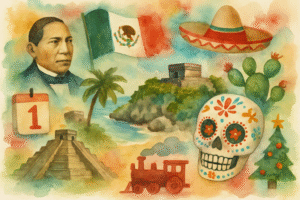Understanding Mexico’s New Telecommunications Law and Its Impact on Connectivity
In the rapidly changing landscape of today’s digital world, connectivity is no longer a luxury—it is a necessity. As such, Mexico has taken significant steps forward with a new Telecommunications and Broadcasting Law that was published in July 2025, aiming to provide internet access to 15 million Mexicans who remain disconnected. This reform not only promotes digital inclusion but paves the way for universal access to essential online services. Intrigued by these changes? Let’s delve deeper into what this new regulation entails and how it will affect millions.
Disbanding Old Structures for New Opportunities
The recently enacted law dissolves the Federal Telecommunications Institute (IFT), replacing it with the newly established Digital Transformation and Telecommunications Agency (ATDT). This transformation represents a fresh start, creating a more cohesive approach to managing internet services. The Regulatory Telecommunications Commission (CRT) now acts as a decentralized regulatory body that operates under ATDT’s umbrella. This shift in structure is designed to streamline processes, although it comes with its own set of complexities, including dual reviews involving the National Commission of Competence (CNA) to oversee monopoly-related issues.
New Obligations and Rights for Operators and Users
This reform brings forth a set of new responsibilities for telecommunications operators. Among the most significant mandates is the requirement for mobile lines to be registered with official identification. Additionally, providers must offer unlocked devices to consumers and ensure access to free services for essential government websites and emergency calls. More than just operational changes, this law strengthens user rights, obligating companies to notify customers of any service changes in advance and ensuring accessibility for individuals with disabilities.
Reaching the Underserved and Enhancing Competition
One noteworthy feature of the law is the authorization for the Federal Electricity Commission (CFE) to provide internet services in areas lacking coverage. This allows the CFE to compete with private companies on equal footing, potentially increasing access in underserved regions. Furthermore, the legislation promotes free concessions for indigenous and Afro-Mexican community networks, reinforcing community-driven initiatives aimed at expanding connectivity. Lastly, stringent regulations are imposed on the blocking of signals in penitentiaries to prevent misuse of mobile devices, demonstrating a commitment to managing telecommunications responsibly.
Aiming for Comprehensive Connectivity
The overarching goal of this legislative initiative is to drastically improve telecommunications coverage across Mexico, particularly in rural and marginalized areas. By focusing on access expansion and elevating the quality of services, the aim is to foster not only an informed population but also a digitally empowered society ready to engage and thrive in the global landscape.
Summary: The Journey Towards Digital Inclusion in Mexico
Mexico’s new regulations in telecommunications are a bold step towards bridging the digital divide faced by millions of citizens. This approach harnesses the power of organizations dedicated to enhancing connectivity while ensuring user rights are upheld. By embracing competition and encouraging community-led initiatives, Mexico is poised to flourish in the realm of digital accessibility. Don’t miss out on the chance to learn how these significant changes might impact you or those around you!
Curious about how this will affect your connectivity? Stay engaged with us!
FAQ: Frequently Asked Questions about Mexico’s Telecommunications Law
What are the main goals of the new Telecommunications Law in Mexico?
The main objective is to provide internet access to 15 million underserved individuals, promoting digital inclusion and ensuring everybody can benefit from online services.
How will the new law affect competition among internet providers?
The law enables the Federal Electricity Commission (CFE) to offer internet services, promoting fair competition with private companies and improving access in areas with limited coverage.
What new obligations do telecommunications operators have under this law?
Operators must register mobile lines with official identification, provide unlocked devices, and ensure access to vital government services for free.
How does the law enhance user rights?
The legislation strengthens user rights by mandating prior notification about service changes and ensuring accessibility for persons with disabilities.
What impact does this law have on rural areas of Mexico?
This law focuses on improving connectivity in rural regions, aiming for comprehensive coverage to ensure that even the most remote areas gain access to essential services.
What measures are in place to prevent misuse of telecom services in prisons?
Strict regulations prevent signal blocking in penitentiaries, thereby managing telecommunications responsibly and preventing the unauthorized use of mobile devices.













